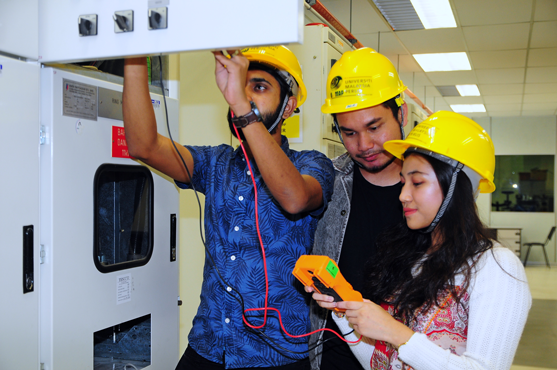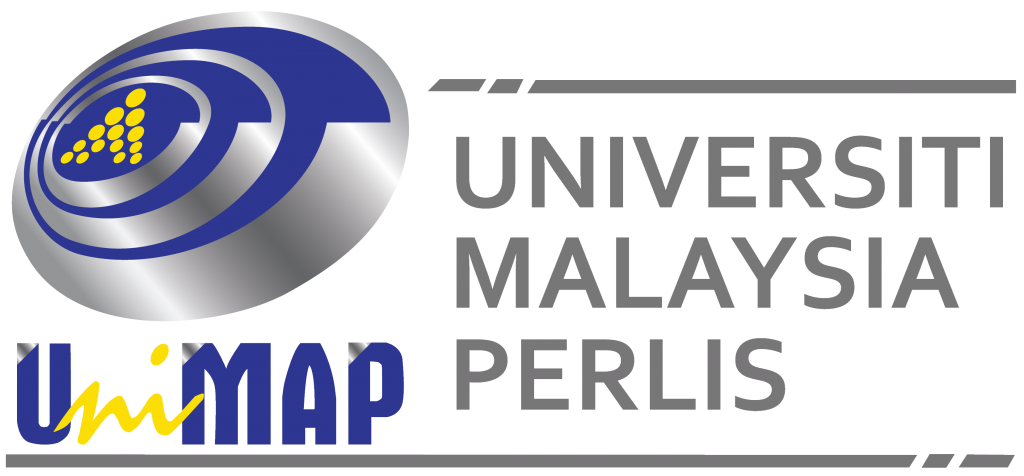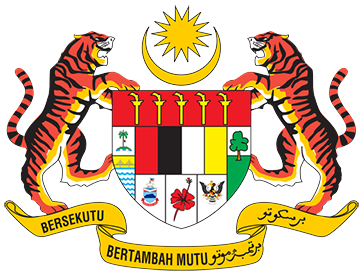Bachelor of Electrical Engineering (Honours)
Sarjana Muda Kejuruteraan Elektrik dengan Kepujian
- Overview
- Career Path
- Subject
- Fees / Entry Requirement
The Electrical Engineering programme leading to the degree of Bachelor of Electrical Engineering (Honours) has a strong focus on the preparation of engineers who can serve the needs of the electric power industry. This programme provides emphasis on the major fields of power engineering, which includes power systems, power electronics, renewable energy, electrical machine design and high voltage engineering. These are offered as compulsory course so as to cope with the rapid change of technology in power engineering. This programme is evaluated by the Engineering Accreditation Council (EAC) and has been accredited by the Board of Engineers Malaysia (BEM).
Fundamental subjects on electrical circuit and power engineering are taught in the first two years of study. A broad background in mathematics and computing, electric circuits and systems, analogue electronic circuits and components, digital systems, instrumentations, communications, electromagnetics and control, necessary to underpin the more advanced courses given in the subsequent years. Students undergo practical training after at the semester break of third year to gain practical knowledge from electrical power industries. Final year student project enhances practical skills and the use of innovative and creative ideas.
Electrical engineering offers diverse career opportunities into a wide range of areas or subfields such as power engineering, electronics, instrumentation, renewable energies, telecommunications, manufacturing, control and automation, manufacturing, defence, mining, and information technology. With thousands of opportunities ahead, many of the branches also overlap with other engineering branches mainly engineering consultation, construction, oil & gas, electromagnetics & waves, semiconductors, microwave engineering, nanotechnology, electrochemistry, mechatronics, electrical materials science, and many more. Moreover, an engineering degree at UniMAP also open the doors for many alternative careers such as project management, government and policy, entrepreneur, technical sales and marketing and also engineering research.
1
Electrical Engineer
2
Electronic Engineer
3
Electrical Maintenance Engineer
4
Electrical and Instrument Engineer
5
Electrical Asset Engineer
6
Electrical Design Engineer
7
Electrical Field Engineer
8
Electrical and Control Engineer
9
Electrical Project Engineer
10
Electrical Reliability Engineer
11
Electrical Risk Engineer
12
Electrical Site Engineer
13
Competent Electrical Engineer
14
Electrical Engineer – Building Services
15
Electrical Engineer – Energy
16
Electrical Engineer – Mining Services
17
Electrical Engineer – Electrometallurgy
18
Electrical Engineer – Oil and Gas
19
Electrical Engineer – High Voltage Power Supply
20
Electrical Engineer – Power Generation
21
Electrical Engineer – Power Systems/Control Systems
22
Electrical Engineer – Secondary Substation Design
23
Electrical Engineer – Water/Waste Water
24
Electrical Engineer/Control Systems
25
Electrical/Instrumentation Engineer
26
Electrical Engineer – Hazardous Area
27
Electrical Telco Engineer
28
Electrical and Instrumentation Engineer
29
Field Electrical Engineer
30
Traction Electrical Systems Design Engineer
The Bachelor of Electrical Engineering with Honours is four years (eight semesters) full-time programme offered by the FTKE UniMAP. This programme is parked under Electrical discipline and the courses offered in this programme are distributed under the broad areas of Electrical Engineering Discipline defined in EAC Manual 2020. The programme provides depth, breadth and flexibility to a curriculum taught by field experts and accredited by Board of Engineers, Malaysia.
CORE COURSES:
Semester 1
- EMJ12002 Engineering Science
- EMJ12103 Electric Circuit I
- EMJ12202 Introduction to Electrical Engineering
Semester 2
- EMJ13003 Electronic Devices
- EMJ13103 Electric Circuit II
- EMJ10003 Basic Computer Programming
- EMJ13203 Electrical Engineering Practices
Semester 3
- EMJ22003 Instrumentation and Measurements
- EMJ22103Electric Circuit III
- EMJ22204 Analog Electronics
- EMJ22304 Digital Electronics
- EMJ20303 Signals and Systems
Semester 4
- EMJ20204 Microcontroller Systems Design
- EMJ23003 Electrical Power Technology
- EMJ23103 Control Systems Engineering
Semester 5
- EMJ32004 Power System Engineering
- EMJ32103 Electromagnetic Theory
- EMJ32204 Electrical Machine
- EMJ32304 Power Electronics I
Semester 6
- EMJ33003 Communication System Engineering
- EMJ33103 Power System Analysis
- EMJ33201 Engineering Team Project I
- EMJ33303 Electrical Energy Utilization
- EMJ33404 Electrical Installation Design I
- EMJ30004 Industrial Training
Semester 7
- EMJ42003 High Voltage Engineering
- EMJ42102 Engineering Team Project II
- EMJ40002 Final Year Project I
- EMJ40103 Management for Engineers
- EMJ42202 Electrical Installation Design II
Semester 8
- EMJ43003 Electrical Drives
- EMJ40004 Final Year Project II
- EMJ40202 Professional Engineers
ELECTIVE COURSES (Choose any 4)
- EMJ44103 Power System Operation and Control
- EMJ44203 Electrical Machine Design
- EMJ44603 Substation Design
- EMJ44303 Power Electronics II
- EMJ44403 Electrical Energy System
- EMJ44503 Industrial Electronic Control
- EMJ44703 Renewable Energy System
- EMJ44803 Power System Protection
COMMON CORES:
- SMQ10103 Engineering Mathematics I
- SMQ10203 Engineering Mathematics II
- SMQ20303 Engineering Mathematics III
- SMQ27103 Engineering Statistics
- SMU12202 Skills and Technology in Communication
UNIVERSITY REQUIRED COURSES:
- SMB10102 Preparatory English
- SMB20102 English for General Communication
- SMB31202 English for Technical Communication
- SMB 1XX02 Option
- SMB41002 University Malay Language (For Local Student)
- SMB11002 Basic Malay Language (For International Student)
- SMU13002 Philosophy and Current Issues
- SMU32202 Thinking Skills
- SMU22402 Engineering Entrepreneurship
- SMU13102 Appreciation of Ethics & Civilizations
- SMZXXXX01 Co-curriculum
Click button below for more details on education fees and entry requirements.
- Programme Objectives (PEO)
- Programme Outcome (PO)
The Programme Educational Objective (PEO) are broad statements that describe the expected
professional and career attributes to be achieved by graduates within 3 to 5 years after graduation.
These are demonstrated either in graduate’s career path or in their professional life advancement.
The PEOs adopted for BEE, are developed to be consistent with the Vision and Mission of UniMAP
and FTKE. In this section, the Vision and Mission of UniMAP and FTKE are firstly described and
followed by the establishment of PEO statements for BEE. Then, the PEO evaluation mechanisms,
attainment results, and the Continuous Quality Improvement (CQI) actions are presented and
discussed. The involvement of the stakeholders in the establishment and review of the PEO
statements, PEO attainments, and CQI processes are also included.
PEOs of BEE together with the performance indicators. The attainability of the
PEOs are measured through a set of indicators and Key Performance Indicator (KPI). The focus of
PEOs will be given to assessment involving career advancement, professional and society, and
lifelong learning.
1
Graduates who have demonstrated career advancement in the field of Electrical Engineering or related engineering field.
2
Graduates who are involved in a professional body or society.
3
Graduates who pursue life-long learning.
Programme Outcome (PO) are statements that describe what students are expected to know and be
able to perform or attain by the time of graduation. These relate to the skills, knowledge, and
behaviour that students acquire through the programme.
1
Apply knowledge of mathematics, natural science, engineering fundamentals and an engineering specialization respectively to the solution of complex engineering problems
2
Identify, formulate, conduct research literature and analyse complex engineering problems reaching substantiated conclusions using first principles of mathematics, natural sciences and engineering sciences
3
Design solutions for complex engineering problems and design systems, components or processes that meet specified needs with appropriate consideration for public health and safety, cultural, societal, and environmental consideration
4
Conduct investigation of complex engineering problems using research-based knowledge and research methods including design of experiments, analysis and interpretation of data, and synthesis of information to provide valid conclusions
5
Create, select and apply appropriate techniques, resources, and modern engineering and IT tools, including prediction and modelling, to complex engineering problems, with an understanding of the limitations
6
Apply reasoning informed by contextual knowledge to assess societal, health, safety, legal and cultural issues and the consequent responsibilities relevant to professional engineering practice and solutions to complex engineering problem
7
Understand and evaluate the sustainability and impact of professional engineering work in the solutions of complex engineering problems in societal and environmental contexts including ability to have entrepreneurship skills
8
Apply ethical principles and commit to professional ethics and responsibilities and norms of engineering practice
9
Function effectively as an individual, and as a member or leader in diverse teams and multi-disciplinary settings
10
Communicate effectively on complex engineering activities with the engineering community and with society at large, such as being able to comprehend and write effective reports and design documentation, make effective presentations, and give and receive clear instructions
11
Demonstrate knowledge and understand of engineering management principles and economic decision-making and apply these to one’s own work, as a member and leader in a team, to manage projects in multidisciplinary environments
12
Recognise the need for and have the preparation and ability to engage in independent and life-long learning in the broadest context of technological change

Quick Points
Campus:
Kampus Alam Pauh Putra, Perlis
Programme Code:
RK23 (intake 2013 – 2019)
UR6522001 (intake 2020 - current)
Specialisation
Electrical Power, Renewable Energy and Control
Study Level:
Undergraduate
Intake:
July
Duration:
4 Years
- Overview
The Electrical Engineering programme leading to the degree of Bachelor of Electrical Engineering (Honours) has a strong focus on the preparation of engineers who can serve the needs of the electric power industry. This programme provides emphasis on the major fields of power engineering, which includes power systems, power electronics, renewable energy, electrical machine design and high voltage engineering. These are offered as compulsory course so as to cope with the rapid change of technology in power engineering. This programme is evaluated by the Engineering Accreditation Council (EAC) and has been accredited by the Board of Engineers Malaysia (BEM).
Fundamental subjects on electrical circuit and power engineering are taught in the first two years of study. A broad background in mathematics and computing, electric circuits and systems, analogue electronic circuits and components, digital systems, instrumentations, communications, electromagnetics and control, necessary to underpin the more advanced courses given in the subsequent years. Students undergo practical training after at the semester break of third year to gain practical knowledge from electrical power industries. Final year student project enhances practical skills and the use of innovative and creative ideas.
Career Path
Electrical engineering offers diverse career opportunities into a wide range of areas or subfields such as power engineering, electronics, instrumentation, renewable energies, telecommunications, manufacturing, control and automation, manufacturing, defence, mining, and information technology. With thousands of opportunities ahead, many of the branches also overlap with other engineering branches mainly engineering consultation, construction, oil & gas, electromagnetics & waves, semiconductors, microwave engineering, nanotechnology, electrochemistry, mechatronics, electrical materials science, and many more. Moreover, an engineering degree at UniMAP also open the doors for many alternative careers such as project management, government and policy, entrepreneur, technical sales and marketing and also engineering research.
1
Electrical Engineer
2
Electronic Engineer
3
Electrical Maintenance Engineer
4
Electrical and Instrument Engineer
5
Electrical Asset Engineer
6
Electrical Design Engineer
7
Electrical Field Engineer
8
Electrical and Control Engineer
9
Electrical Project Engineer
10
Electrical Reliability Engineer
11
Electrical Risk Engineer
12
Electrical Site Engineer
13
Competent Electrical Engineer
14
Electrical Engineer – Building Services
15
Electrical Engineer – Energy
16
Electrical Engineer – Mining Services
17
Electrical Engineer – Electrometallurgy
18
Electrical Engineer – Oil and Gas
19
Electrical Engineer – High Voltage Power Supply
20
Electrical Engineer – Power Generation
21
Electrical Engineer – Power Systems/Control Systems
22
Electrical Engineer – Secondary Substation Design
23
Electrical Engineer – Water/Waste Water
24
Electrical Engineer/Control Systems
25
Electrical/Instrumentation Engineer
26
Electrical Engineer – Hazardous Area
27
Electrical Telco Engineer
28
Electrical and Instrumentation Engineer
29
Field Electrical Engineer
30
Traction Electrical Systems Design Engineer
Subject
The Bachelor of Electrical Engineering with Honours is four years (eight semesters) full-time programme offered by the FTKE UniMAP. This programme is parked under Electrical discipline and the courses offered in this programme are distributed under the broad areas of Electrical Engineering Discipline defined in EAC Manual 2020. The programme provides depth, breadth and flexibility to a curriculum taught by field experts and accredited by Board of Engineers, Malaysia.
CORE COURSES:
Semester 1
- EMJ12002 Engineering Science
- EMJ12103 Electric Circuit I
- EMJ12202 Introduction to Electrical Engineering
Semester 2
- EMJ13003 Electronic Devices
- EMJ13103 Electric Circuit II
- EMJ10003 Basic Computer Programming
- EMJ13203 Electrical Engineering Practices
Semester 3
- EMJ22003 Instrumentation and Measurements
- EMJ22103Electric Circuit III
- EMJ22204 Analog Electronics
- EMJ22304 Digital Electronics
- EMJ20303 Signals and Systems
Semester 4
- EMJ20204 Microcontroller Systems Design
- EMJ23003 Electrical Power Technology
- EMJ23103 Control Systems Engineering
Semester 5
- EMJ32004 Power System Engineering
- EMJ32103 Electromagnetic Theory
- EMJ32204 Electrical Machine
- EMJ32304 Power Electronics I
Semester 6
- EMJ33003 Communication System Engineering
- EMJ33103 Power System Analysis
- EMJ33201 Engineering Team Project I
- EMJ33303 Electrical Energy Utilization
- EMJ33404 Electrical Installation Design I
- EMJ30004 Industrial Training
Semester 7
- EMJ42003 High Voltage Engineering
- EMJ42102 Engineering Team Project II
- EMJ40002 Final Year Project I
- EMJ40103 Management for Engineers
- EMJ42202 Electrical Installation Design II
Semester 8
- EMJ43003 Electrical Drives
- EMJ40004 Final Year Project II
- EMJ40202 Professional Engineers
ELECTIVE COURSES (Choose any 4)
- EMJ44103 Power System Operation and Control
- EMJ44203 Electrical Machine Design
- EMJ44603 Substation Design
- EMJ44303 Power Electronics II
- EMJ44403 Electrical Energy System
- EMJ44503 Industrial Electronic Control
- EMJ44703 Renewable Energy System
- EMJ44803 Power System Protection
COMMON CORES:
- SMQ10103 Engineering Mathematics I
- SMQ10203 Engineering Mathematics II
- SMQ20303 Engineering Mathematics III
- SMQ27103 Engineering Statistics
- SMU12202 Skills and Technology in Communication
UNIVERSITY REQUIRED COURSES:
- SMB10102 Preparatory English
- SMB20102 English for General Communication
- SMB31202 English for Technical Communication
- SMB 1XX02 Option
- SMB41002 University Malay Language (For Local Student)
- SMB11002 Basic Malay Language (For International Student)
- SMU13002 Philosophy and Current Issues
- SMU32202 Thinking Skills
- SMU22402 Engineering Entrepreneurship
- SMU13102 Appreciation of Ethics & Civilizations
- SMZXXXX01 Co-curriculum
Fees / Entry Requirement
Click button below for more details on education fees and entry requirements.
Programme Objectives (PEO)
The Programme Educational Objective (PEO) are broad statements that describe the expected
professional and career attributes to be achieved by graduates within 3 to 5 years after graduation.
These are demonstrated either in graduate’s career path or in their professional life advancement.
The PEOs adopted for BEE, are developed to be consistent with the Vision and Mission of UniMAP
and FTKE. In this section, the Vision and Mission of UniMAP and FTKE are firstly described and
followed by the establishment of PEO statements for BEE. Then, the PEO evaluation mechanisms,
attainment results, and the Continuous Quality Improvement (CQI) actions are presented and
discussed. The involvement of the stakeholders in the establishment and review of the PEO
statements, PEO attainments, and CQI processes are also included.
PEOs of BEE together with the performance indicators. The attainability of the
PEOs are measured through a set of indicators and Key Performance Indicator (KPI). The focus of
PEOs will be given to assessment involving career advancement, professional and society, and
lifelong learning.
1
Graduates who have demonstrated career advancement in the field of Electrical Engineering or related engineering field.
2
Graduates who are involved in a professional body or society.
3
Graduates who pursue life-long learning.
Programme Outcome (PO)
Programme Outcome (PO) are statements that describe what students are expected to know and be
able to perform or attain by the time of graduation. These relate to the skills, knowledge, and
behaviour that students acquire through the programme.
1
Apply knowledge of mathematics, natural science, engineering fundamentals and an engineering specialization respectively to the solution of complex engineering problems
2
Identify, formulate, conduct research literature and analyse complex engineering problems reaching substantiated conclusions using first principles of mathematics, natural sciences and engineering sciences
3
Design solutions for complex engineering problems and design systems, components or processes that meet specified needs with appropriate consideration for public health and safety, cultural, societal, and environmental consideration
4
Conduct investigation of complex engineering problems using research-based knowledge and research methods including design of experiments, analysis and interpretation of data, and synthesis of information to provide valid conclusions
5
Create, select and apply appropriate techniques, resources, and modern engineering and IT tools, including prediction and modelling, to complex engineering problems, with an understanding of the limitations
6
Apply reasoning informed by contextual knowledge to assess societal, health, safety, legal and cultural issues and the consequent responsibilities relevant to professional engineering practice and solutions to complex engineering problem
7
Understand and evaluate the sustainability and impact of professional engineering work in the solutions of complex engineering problems in societal and environmental contexts including ability to have entrepreneurship skills
8
Apply ethical principles and commit to professional ethics and responsibilities and norms of engineering practice
9
Function effectively as an individual, and as a member or leader in diverse teams and multi-disciplinary settings
10
Communicate effectively on complex engineering activities with the engineering community and with society at large, such as being able to comprehend and write effective reports and design documentation, make effective presentations, and give and receive clear instructions
11
Demonstrate knowledge and understand of engineering management principles and economic decision-making and apply these to one’s own work, as a member and leader in a team, to manage projects in multidisciplinary environments
12
Recognise the need for and have the preparation and ability to engage in independent and life-long learning in the broadest context of technological change



